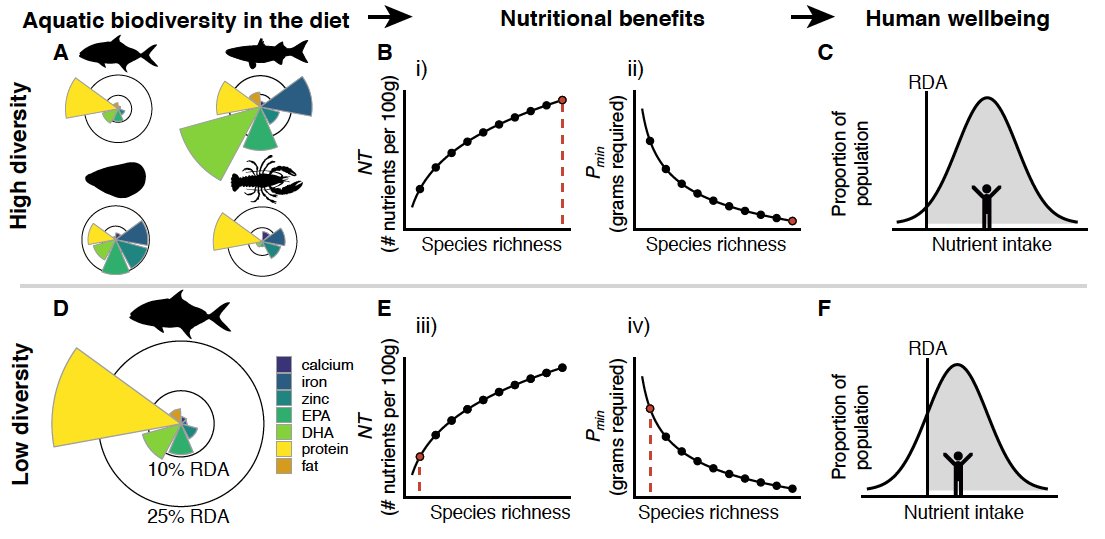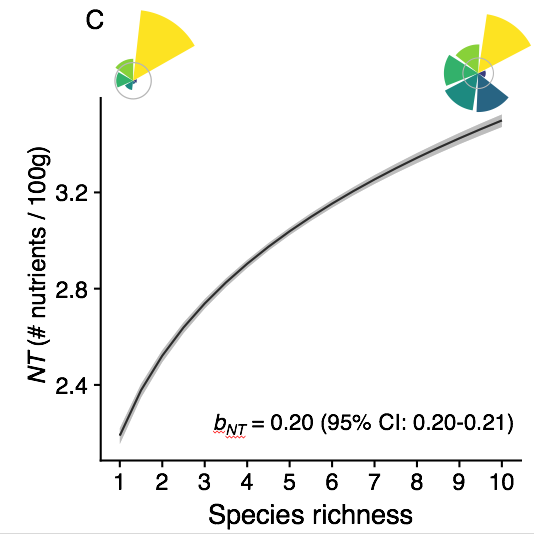
🚨New in @PNASNews! We demonstrate that aquatic #biodiversity directly benefits humanity via nutritional benefits of #seafood.
I’m thrilled to share this: it's a BIG one for me, it’s the product of > 7 years (!) of developing ideas & collecting data.
A🧵 pnas.org/content/118/15…
I’m thrilled to share this: it's a BIG one for me, it’s the product of > 7 years (!) of developing ideas & collecting data.
A🧵 pnas.org/content/118/15…
@mioconnor and I bridge the gap between #biodiversity science and human nutrition science & demonstrate mechanistic links between aquatic #biodiversity and human nutritional well-being in the context of #AquaticFoods. 

We answer one of the most pressing questions in ecology:
Does biodiversity per se (species richness and ecological functional diversity), distinct from the identities and abundance of species enhance human well-being?
#AquaticFoods
Does biodiversity per se (species richness and ecological functional diversity), distinct from the identities and abundance of species enhance human well-being?
#AquaticFoods

3/ How did we answer this question? We assembled a new dataset of nutrient concentrations, contaminant concentrations and #ecological traits of >800 seafood species. We focused on the #micronutrients and #FattyAcids. In total, we assembled more than 5000 observations! 

4/ We then harnessed classic ecological theory - #biodiversity - ecosystem functioning theory, to test for quantitative links between #biodiversity and nutritional benefits. This is #trait-based ecology meets #biodiversity theory meets human #nutrition science! 

5/ We tested for 'biodiversity effects' using #biodiversity experiments with a replacement design, borrowing approaches from biodiversity experiments in #grasslands, and quantifying the slopes of the relationship between #biodiversity & #nutritional benefit 

6/ Surprisingly, we found no effect of #biodiversity on #protein provisioning (i.e. portion size required to reach Recommended Dietary Allowance for protein was independent of species richness) -- see yellow lines below 

7/ In contrast to #protein, we found strong benefits of #biodiversity for the #micronutrients and #FattyAcids. Biodiversity effects are as strong as those documented in #forests & #grasslands! Increasing #biodiversity allows people to reach nutritional needs much more efficiently 

8/ Why was there a strong benefit of #biodiversity for the #micronutrients but not for #protein? We discovered something really interesting! We found the distribution of #protein concentrations in seafood assemblages are symmetrical, but the #micronutrients are highly skewed! 

9/ We also found benefits of #biodiversity when we considered multiple nutritional benefits simultaneously -- this is called ecosystem 'multifunctionality'. Increasing species richness is associated with reaching more nutritional targets per 100g portion 

10/ Nutritional benefits were related to the #functional #trait diversity in aquatic assemblages -- the more functionally diverse the system, the greater the nutritional benefit (greater probability of reaching 5 #micronutrient and #FattyAcid targets simultaneously) 

12/ In the mean time I have many many people to thank @ZoologyUBC and @UBCoceans who supported this work over my PhD years including @coru_ubc @lab_schulte @mtsengphd @thompson_pl @JennSunday @SallyNAitken -- thank you!! 🦞🦐🐟🎣🍣
• • •
Missing some Tweet in this thread? You can try to
force a refresh




